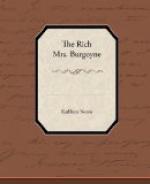He was presently aware that someone was telling him that nobody was to blame. Details were volunteered, and he listened quietly, like a dispassionate onlooker. “Hits you pretty hard, Barry,” sympathetic voices said.
“Ruins me,” he answered briefly.
And it dawned upon him sickly and certainly that it was true. He was ruined now. All his hopes had been rooted here, in what was now this mass of wet ashes steaming up into the fog. Here had been his chance for a livelihood, and a name; his chance to stand before the community for what was good, and strong, and helpful. He had been proud because his editorials were beginning to be quoted here and there; he had been keenly ambitious for Sidney’s plans, her hopes for Old Paloma. How vain it all was now, and how preposterous it seemed that only an hour ago he had let his thoughts of the future include her—always so far above him, and now so infinitely removed!
She would be sympathetic, he knew; she would be all kindness and generosity. And perhaps, six months ago, he would have accepted more generosity from her; but Barry had found himself now, and he knew that she had done for him all he would let her do.
He smiled suddenly and grimly as he remembered another bridge, just burned behind him. If he had not promised Hetty’s mother that her income should go on uninterruptedly, he might have pulled something out of this wreckage, after all. For a moment he speculated: he could sell the Mission Street property now; he might even revive the mail, after a while—
But no, what was promised was promised, after all, and poor little Mrs. Scott must be left to what peace and pleasure the certainty of an income gave her. And he must begin again, somehow, somewhere, burdened with a debt, burdened with a heartache, burdened with—His heart turned with sudden warmth to the thought of Billy; Billy at least, staunch little partner of so many dark days, and bright, should not be counted a burden.
Even as he thought of his son, a small warm hand slid into his with a reassuring pressure, and lie looked down to see the little figure beside him. Moment after moment went by, timid shafts of gold sunshine were beginning to conquer the mist now, and still father and son stood silent, hand in hand.
CHAPTER XVII
The mischief was done; no use to stand there by the smoking ruins of what had been his one real hope for himself and his life. After a while Barry roused himself. There seemed to be nothing to do at the moment, no more to be said. He and Billy walked up River Street to their own gate, but when they reached it, Barry, obeying an irresistible impulse, merely left his coat and suit-case there, and went on through the Hall gateway, and up to the house.
The sun was coming out bravely now, and already he felt its warmth in the garden. Everywhere the fog was rising, was fading against the green of the trees. He followed a delicious odor of wood smoke and the sound of voices, to the barnyard, and here found the lady of the house, with her inevitable accompaniment of interested children. Sidney was managing an immense brush fire with a long pole; her gingham skirt pinned back trimly over a striped petticoat, her cheeks flushed, her hair riotous under a gipsy hat.




